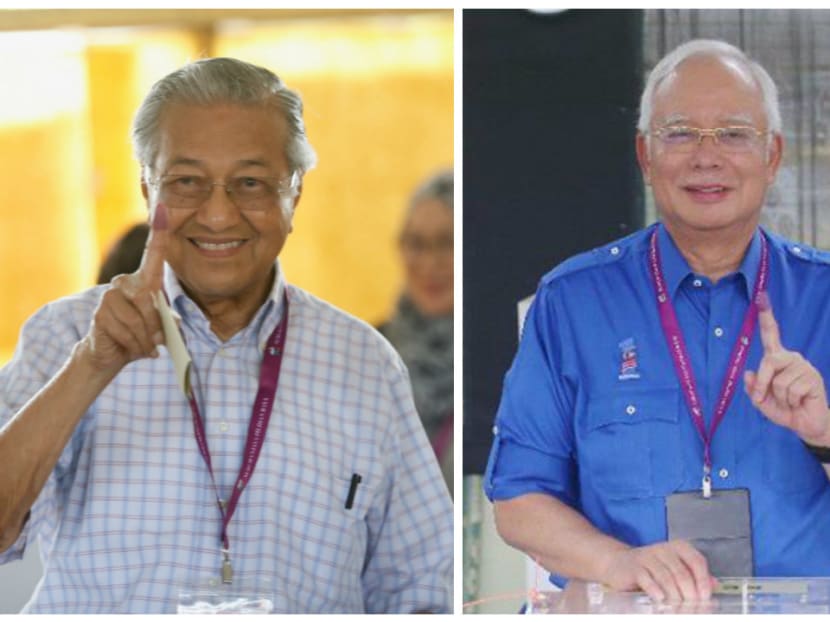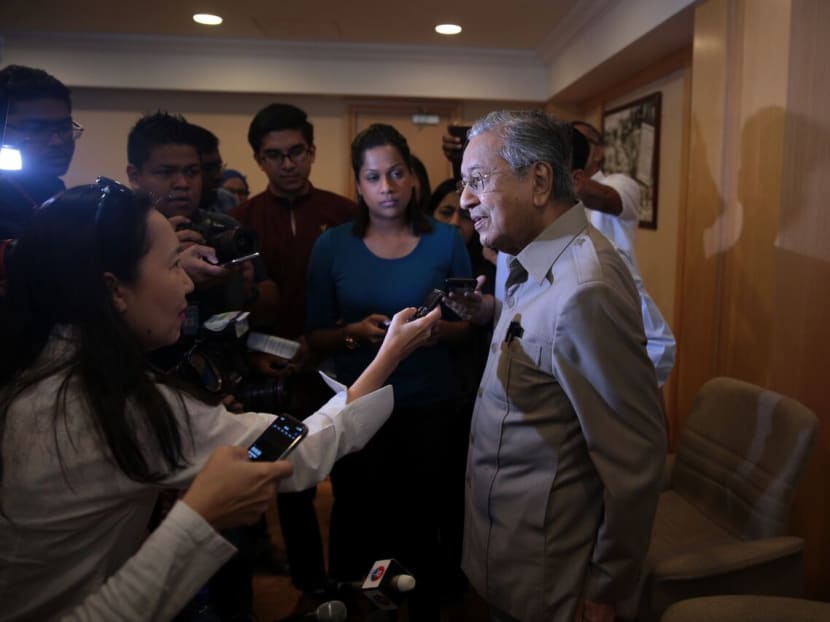Despite robust challenge from opposition, BN expected to retain power in Malaysian GE
KUALA LUMPUR — After a hectic election campaign lasting over 11 days, Malaysians will on Wednesday (May 9) cast their votes in what is widely seen as the most hotly contested election since the country's independence 61 years ago. The stakes are particularly high for Prime Minister Najib Razak and his predecessor-turned-foe Mahathir Mohamad, who is now leading PH's charge against BN, as defeat would likely mark the end of either’s political career.

Dr Mahathir Mohamad of the opposition Pakatan Harapan coalition (left) and Prime Minister Najib Razak of the Barisan Nasional coalition (right) cast their votes on Wednesday (May 9).
KUALA LUMPUR — After a hectic election campaign lasting over 11 days, Malaysians will on Wednesday (May 9) cast their votes in what is widely seen as the most hotly contested election since the country's independence 61 years ago.
Some 15 million voters will decide if they want to stick with the ruling Barisan Nasional (BN) coalition that has ruled Malaysia for six decades or go with the opposition Pakatan Harapan (PH) pact that has promised change, including removing the Goods and Services Tax that has become a bugbear of many voters.
The stakes are particularly high for Prime Minister Najib Razak and his predecessor-turned-foe Mahathir Mohamad, who is now leading PH's charge against BN, as defeat would likely mark the end of either’s political career.
PH has traditionally relied on urban votes and support from the ethnic Chinese and Indian communities, while BN’s core support base is among rural Malays.
But this time round, PH is betting that Dr Mahathir can draw in crucial Malay voters who have grown disillusioned by increased costs of living and are yearning for change.
A poll released by pollster Merdeka Center on Tuesday evening – based on a survey carried among 1,579 registered voters in Peninsular Malaysia from April 28 to noon on May 8 – found that BN is poised to retain federal power by winning a simple majority of the 222 parliamentary seats being contested.
“We found that Barisan Nasional presently retains a sizable seat advantage over rivals, Pakatan Harapan and PAS (Parti Islam Se-Malaysia), the poll report said, noting that BN has 100 safe seats, compared to 83 for PH and two for PAS.
The remaining 37 seats will be a toss-up, it said, adding that such a high number of marginal seats implies that voter turnout will be a critical factor in determining the outcome of many seats on election day.
The poll found that BN enjoys 44.3 per cent support among the crucial Malay vote bank - making up more than 60 per cent of voters – compared with 27.6 per cent for PH and 28.1 per cent for PAS.
“Given the above findings, its retention of a plurality of support among Malay voters, alongside PAS’ ability to retain at least one-quarter of the Malay vote share, we anticipate that BN will prevail in the election.”
It also predicted the opposition winning 43.4 per cent of the popular vote, with BN getting 37.3 per cent. This was a drop from 43.7 per cent and 40.3 per cent respectively from another poll released by the centre a week ago.
The Eurasia Group consultancy has put the odds of a PH win at 15 per cent.
"Momentum is with the opposition, but we believe it is unlikely that they will pull off a surprise victory," it said.
Eurasia’s Asia director Peter Mumford added: “Najib has placed too many obstacles in their way and there is too little time before the vote on May 9 to overcome those.”
Among others, a revision of electoral boundaries has tilted the election in BN's favour by moving large numbers of opposition-leaning voters into fewer parliamentary constituencies.
Another factor against PH is the decision by its former ally PAS to contest in 158 seats, resulting in a high percentage of multi-cornered fights which observers say will split the opposition vote to benefit BN.
Malaysia’s first-past-the-post, or simple majority, system means the party or pact that gets the most seats in parliament wins.
This was exactly what happened in 2013, when BN won power even though it lost the popular vote.
In Wednesday's poll, a record 2,333 candidates are running in 222 parliamentary and 505 state seats nationwide, with some seats even seeing six-way fights.
The hectic campaigning period saw candidates making claims of sabotage and trading personal attacks.
And for the first time, thousands of Malaysians came together to pool funds to help their fellow citizens working out of state to return home to vote.
BN stuck to its tried-and-tested method of door-to-door campaigning and handouts of goodies and promises of infrastructure development.
But it also upped its game on social media with an aggressive digital campaign which saw many candidates share short video clips and eye-catching infographics via Facebook, Twitter and WhatsApp.
Leading the charge was Datuk Seri Najib, who travelled to Sabah, Pahang, Kuala Lumpur and Kedah – including Langkawi where Dr Mahathir is contesting - to canvass for votes.
The BN president reiterated the pact's well-used lines about its role in protecting Islam and promoting Malay interests and urged voters to be wary of the Democratic Action Party (DAP).
“Do we want a party that is churning out lies to lead us?” Datuk Seri Najib said in a tweet on Sunday (May 6).
"If we look at the behaviour of one or two people (in the opposition), we cannot be confident that they will look after our interests, especially the people in the rural areas, the interests of Islam and the interests of the Malays," he told a rally on the same day.
On Monday, his press secretary kept up the attack on DAP, saying that the predominantly Chinese party was using Dr Mahathir to divide the Malays.
"DAP are using the nonagenarian as camouflage to split the Malay vote,” Tengku Sariffuddin said in a statement.
“Should they win, they will never let Mahathir become prime minister - they know him too well."
And on Tuesday morning, with less than 24 hours to polling, Datuk Seri Najib put out a blog post urging Malaysians to trust BN to continue to build up the country as it has done so for over 60 years and not risk their future.
“It is a country we should be very proud of. It is a country that has been built by a partnership of BN and the people. This is a partnership you know, you can rely on, which is listening to you, and which has delivered and will continue to deliver for you," he wrote.
“I pledge that if you put your trust once again in Barisan Nasional, we will continue that work for you, in the service of the people, and we will continue to build this country together. Let us unite for a greater Malaysia."

PH is banking on Dr Mahathir, seen here speaking to reporters in Putrajaya on May 4, to pull support of Malay voters from BN. Photo: Jason Quah / TODAY
In the other camp, a PH hampered by lack of funds and volunteers has relied on using mammoth rallies fronted by well-known leaders and augmented by Facebook Live to convey its message of change.
On the campaign trail, PH leaders have continuously highlighted alleged wrongdoings of Datuk Seri Najib and the BN government.
“We only know one government since the country achieved its independence,” said Dr Mahathir at a rally in Malacca on Friday. “The longer this government stays, the worse it gets.”
At the same time, Dr Mahathir’s Parti Pribumi Bersatu Malaysia (PPBM) colleague Muhyiddin Yassin said at a rally in Pagoh, Johor, that Malaysia has never had to deal with a scandal like the financial irregularities at state investment firm 1Malaysia Development Berhad (1MDB).
“We live in extraordinary times now where our leaders are the cause of our problems,” he told settlers from the national palm plantation operator Federal Land Development Authority (Felda), adding that they must vote to “save Malaysia”.
Contesting under a single logo – that of component party Parti Keadilan Rakyat (PKR) – for the first time, the coalition's bid to oust BN got a boost halfway through the campaigning period when former senior BN ministers Daim Zainuddin and Rafidah Aziz rallied for the opposition against Datuk Seri Najib.
The two long-time loyalists of Dr Mahathir were quickly sacked by ruling party Umno for colluding with the opposition.
"They will have some impact among Umno stalwarts but the question is whether it is going to be large enough to make an impact on the votes," Mr Ibrahim Suffian, head of Merdeka Centre, told TODAY.
He added that it is "conservatively" predicting a "plus or minus 5 per cent" of the 2013 election result for BN.
Before Parliament was dissolved, BN held 132 seats, PH 77 and PAS 13.
Some analysts like Universiti Malaya's Prof Awang Azman Pawi predicts that PH could take between 87 and 107 federal seats.
"If PH succeeds in capturing rural votes in Felda settlements or in Sabah, then they can gain up to 119 seats," he said.
However, Umno supreme council member Irmohizam Ibrahim believes BN will improve its seat count from five years ago based on ground sentiments and a stronger party machinery.
“I have gone to the ground and I can see the response towards BN is very good, I can see the waves of support for our candidates," he told TODAY.
"I have a gut feeling that we can achieve more than 132 seats.”

Fauzi Abu Bakar, PAS candidate for the Lembah Pantai constituency in Kuala Lumpur, films a campaign video for social media against the backdrop of the capital. Photo: Nuria Ling/TODAY
PH and BN aside, eyes will also be on how PAS will fare, having opted to go into the polls alone after breaking off with the opposition pact in 2015.
"At most, PAS can only gain seven seats nationwide and these will be mostly in Kelantan and Terengganu," said Ilham Centre executive director Hisomuddin Bakar.
The Islamist party did well in the 2008 and 2013 polls when it was part of the Opposition coalition, on the back of support from non-Muslims but the tide has since turned against it.
Voters disgruntled by PAS’ flirtation with the Umno, the biggest party in BN, and its divorce from the then opposition Pakatan Rakyat pact, have defected to PH, weakening the Islamist party.
PAS has dismissed analysts' dire predictions.
“If we win 40 seats, we can be the kingmaker,” PAS President Abdul Hadi Awang said at a rally in Terengganu on Monday night, adding that will allow the Islamist party to discuss with either BN or PH to form a government.
CLOSE FIGHT AT STATES LEVEL
PH is expected to retain the two states of Penang and Selangor that it controls although BN could make inroads in the latter due to the redelineation exercise and multi-cornered fights.
Currently, BN holds 12 seats in the 56-seat assembly, while PH has 29 and PAS 13.
"PH will win 35 to 38 state seats in Selangor while BN will get between 18 and 21 seats," said Dr Lee Hwok Aun from ISEAS - Yusof Ishak Institute who has been on the ground assessing the performance of both pacts in Selangor.
"But we can also expect many close results, with widespread three-cornered contests. Up to one-third of the 56 seats might be won by less than 3 percentage point margins."
Selangor BN chief Noh Omar is however confident that the ruling coalition can recapture back the crown jewel it lost to the opposition 10 years ago.
"BN has been working doubly hard since nomination on April 28 and I am confident we can win 10 parliamentary and 30 state seats," he told pro-Umno news outlet SuaraTV.
Close fights are also expected in the battleground states of Johor, Kedah and possibly Terengganu, and if one of these falls to the opposition, it will be a big blow to BN.
A recent Merdeka Centre poll found out Malay support for BN in Johor has dropped by 21 per cent since the 2013 election.
PKR president Wan Azizah Wan Ismail told TODAY on Monday that she had an “expectant feeling” the opposition alliance can prevail in the southern state.
“I feel there’s an almost palpable sense of excitement that there’s going to be change, especially in Johor,” she said.
In Kedah, Dr Mahathir's popularity in the state is expected to make a BN victory harder to come by there.
The state’s older constituents age 60 and above hold the key to the election outcome, as they comprise 57 per cent of the over 1.14 million population in the state.
Analysts said that the "Mahathir factor" could sway them over to PH as the group tends to be more sentimental towards the former premier.
“That is because the concept of gratitude in the Malay culture is strong,” said UM’s Assoc Prof Awang Azman, who pointed out that there is a high possibility of the opposition capturing the state for the first time.
At the east coast state of Terengganu, PAS is said to stand a good chance to wrest the state due to splits within Umno in the state.
PAS in turn may lose its 28-year grip on Kelantan to Umno, due to voters' unhappiness over a lack of progress and the potential rise of splinter group Parti Amanah Nasional (Amanah).
PH, however, is not expected to make much headway in other states.
The Borneo states of Sabah and Sarawak - which account for a quarter of seats in Parliament - is expected to remain BN's strongholds although opposition Parti Warisan Sabah has been making some inroads.
"For Sarawak, it is almost status quo in terms of seats. For Sabah, Parti Warisan Sabah is gaining momentum in the east coast," said Dr Arnold Puyok, the head of Department of Politics and International Relations at the Faculty of Social Sciences in Universiti Malaysia Sarawak.
Warisan is set up by former Umno vice-president Shafie Apdal, after he quit the party in 2016.
"They (Warisan) have some pockets of support but it is not enough to dislodge Umno and BN from Sabah," added Dr Puyok.
BN is expected to retain states like Pahang, Perlis, Perak, Malacca and Negeri Sembilan, which contribute 55 federal seats altogether.
Both BN and PH have been urging Malaysians to go out and vote on Wednesday.
Polling will last from 8 am to 5 pm, with official results expected at around midnight.
With only one winner in this extraordinary contest between Mr Najib and Dr Mahathir, the stakes could not be higher for either.
"Just as this is a do-or-die election for Dr Mahathir, it is the same for Najib. In other words, the political futures of both leaders ride on the outcome of the 2018 election," said Dr Mustafa Izzuddin, research fellow at the ISEAS-Yusof Ishak Institute.
A worse performance for the ruling coalition than in the 2013 national polls, even if it retains power, would likely raise questions within the ruling bloc about Mr Najib’s leadership.
"His position as president of Umno will not be safe," said Mr Asrul Hadi Abdullah, an analyst with political risk consultancy BowerGroupAsia.
"Expect another internal revolt to remove him similar to what happened to Abdullah Badawi," he added, referring to Mr Najib's predecessor who was forced to step down a year after the 2008 national polls.
The 2008 elections saw BN lose its parliamentary supermajority for the first time since 1969.
A loss for Dr Mahathir, 92, meanwhile, will mean political irrelevance and a weakened opposition.
"Time is not with him and this could be the end of his legacy," said Universiti Sains Malaysia Prof Sivamurugan Pandian, who specialises in political sociology.
"As for PH, they either have to restructure their cooperation with their partners or come up with a new game plan since by June, (jailed Opposition leader) Anwar Ibrahim will be released from prison."









